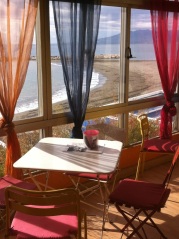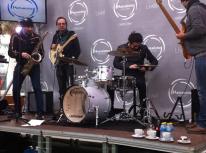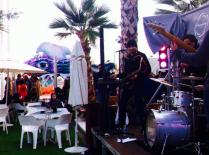I’ve never been one for the nine-to-five. And fortunately, I guess I’ve never really had to do it. Journalism involved some quite strange hours, as did provincial and touring theatre. Campaigning for the rights of community care service-users and attending late-night Council meetings continued the irregularity, as did freelance training. But retirement? That should be a whole lot more straightforward. You’d think.
You expect your life to change when you take early retirement. And when you move to another country. But you also have some expectations of what those changes might mean, how life might pan out. Relaxing, breakfasting on the patio, watering the lemon tree, taking a light tapas lunch at a local bar, reading a lot, perhaps joining a local book club, and gently exploring southern Spain. It hasn’t turned out quite as expected.
another country. But you also have some expectations of what those changes might mean, how life might pan out. Relaxing, breakfasting on the patio, watering the lemon tree, taking a light tapas lunch at a local bar, reading a lot, perhaps joining a local book club, and gently exploring southern Spain. It hasn’t turned out quite as expected.
It’s been a seriously odd week. I’m writing this crammed into a Ryanair seat, on a visit to Dorset. As the snow-capped peaks of northern Spain slowly slip away behind us, memories of the past week jostle for space, fighting for top slot.
Last week I went back to college. I started the B2 Spanish course at La Escuela Oficial de Idiomas in Málaga. Out of twenty students, I am the only Brit. My co-students hail from Syria, Korea, Iran, Brazil, France, Russia, Ukraine, Austria, Morocco … a total of 16 countries. A fabulous mix, and all highly committed to improving their Spanish. It’s an intensive course, four mornings a week for four months. Once a week I go in early to do the breakfast shift with Los Ángeles Malagueños de la Noche. Another day I stay after class to do a lunch shift then wander through central Málaga finding new bars and new galleries.
One day a week I head straight from class to meet up with Jose. Although we use both languages, it has long stopped being an intercambio, it slipped unnoticed into a good friendship. Last week when I reached the cafe he was reading a stapled printout, preparing for a training session he has to deliver. Discovered by Manchester Metropolitan Police a few years ago, and translated from Arabic into English, it is the manual for Al-Qaeda cells in Europe. I skimmed through it, and clarified a couple of unclear sections that Jose had highlighted. It was frightening stuff. Fascinating, but hugely depressing. The sheer horror of its stated priorities and methods was chilling to read, the horror not diminished by the juxtaposition of reading it in a sunny Costa del Sol beach bar.
friendship. Last week when I reached the cafe he was reading a stapled printout, preparing for a training session he has to deliver. Discovered by Manchester Metropolitan Police a few years ago, and translated from Arabic into English, it is the manual for Al-Qaeda cells in Europe. I skimmed through it, and clarified a couple of unclear sections that Jose had highlighted. It was frightening stuff. Fascinating, but hugely depressing. The sheer horror of its stated priorities and methods was chilling to read, the horror not diminished by the juxtaposition of reading it in a sunny Costa del Sol beach bar.
Back in Colmenar we had our weekly intercambio group. Initially started to help a few local Spaniards to improve their English pronunciation, it has morphed into an intercambio and now some of the English who come are taught new phrases to practise during the week. Two young biologists from the honey museum attend, and I found myself shouting “BEE-keepers” and “BEE-hives” with them, trying to correct their pronunciation. Both were swallowing the first, stressed syllable (clearly the most important!) and were saying “be-KIPP-ers” and “be-HIVES”. The Spanish language never puts two of the same vowel together in one syllable, so words like SHEEP and BOOT are notoriously difficult for them. And BEE apparently. Which is unfortunate if you work in the bee industry.
Two young biologists from the honey museum attend, and I found myself shouting “BEE-keepers” and “BEE-hives” with them, trying to correct their pronunciation. Both were swallowing the first, stressed syllable (clearly the most important!) and were saying “be-KIPP-ers” and “be-HIVES”. The Spanish language never puts two of the same vowel together in one syllable, so words like SHEEP and BOOT are notoriously difficult for them. And BEE apparently. Which is unfortunate if you work in the bee industry.
I got nobbled in the town hall for a quick photo-shoot for which I was woefully unprepared. I was just popping in to update Paco at the village’s educational charity about progress (or lack of it) on our project. He had other ideas, and summonsed Pepe and his camera to grab a pic of us together. It was his last day in the other part of his job, as Tesorero (Finance Officer) at the town hall, and he wanted the photo taken in the formality of his office, so I couldn’t refuse. But I feel my casual cut-off t-shirt slightly spoils the effect. The scroll is written in florid, almost Baroque language. High Spanish at its most colourful. One sentence escaped me and I typed it into Google Translate, to be informed that I was being thanked for donating my large bra. Umm, I don’t think so! Always better to use my proper Spanish dictionary, which (all in Spanish) explains each word more straightforwardly. What a relief – it turns out that sostén doesn’t only mean bra, it can mean “support” in the broadest sense too. Thanks for my support. That’s better, though still an unexpected and unnecessary gesture.
grab a pic of us together. It was his last day in the other part of his job, as Tesorero (Finance Officer) at the town hall, and he wanted the photo taken in the formality of his office, so I couldn’t refuse. But I feel my casual cut-off t-shirt slightly spoils the effect. The scroll is written in florid, almost Baroque language. High Spanish at its most colourful. One sentence escaped me and I typed it into Google Translate, to be informed that I was being thanked for donating my large bra. Umm, I don’t think so! Always better to use my proper Spanish dictionary, which (all in Spanish) explains each word more straightforwardly. What a relief – it turns out that sostén doesn’t only mean bra, it can mean “support” in the broadest sense too. Thanks for my support. That’s better, though still an unexpected and unnecessary gesture.
And it was Carnaval week. Málaga turns into a massive playground for the week. Meeting up with assorted friends (sometimes planned, sometimes not) – everyone is in the city to
drink in the atmosphere. Friday tapas at La Dehesa, dive into the Quijotadas exhibition of satirical cartoons and paintings based around Don Quijote and Sancho Panza, groups of street-singers along Calle Larios and in narrow back-streets, a sprint around an exhibition of photos of the Axarquía region’s wine harvest, and the Drag Queen Contest in Plaza de la Constitución (at which I never fail to be surprised by the enormous and knowledgeable crowd).

Foto: Emma Munck
A quiet Saturday with just a lunch-shift at Los Ángeles, then back into the thick of Carnaval on Sunday for the procession of the Gran Boquerón (yes, you did translate that correctly, it’s the procession of the Big Anchovy). Rainclouds over the port look heavy and the jazz-rock concert we are heading to at a harbour-side bar starts early to beat the rain. Roberto (the saxophonist from Chambao) plays a storm along with his  new band, but unfortunately does so literally, and rain stops play for ten minutes while the band cover their instruments and grab coffee and water (so rock’n’roll!). The Carnaval procession approaches during the second set and the massive blue anchovy floats by, accompanied by bands, dancers,
new band, but unfortunately does so literally, and rain stops play for ten minutes while the band cover their instruments and grab coffee and water (so rock’n’roll!). The Carnaval procession approaches during the second set and the massive blue anchovy floats by, accompanied by bands, dancers, acrobats, jugglers, a few drag-queens and assorted groups in fancy-dress. It heads to the beach to be immolated as the finale of Carnaval 2015. At the bar the band plays on, reluctant (as all proper musicians are) to put down their instruments.
acrobats, jugglers, a few drag-queens and assorted groups in fancy-dress. It heads to the beach to be immolated as the finale of Carnaval 2015. At the bar the band plays on, reluctant (as all proper musicians are) to put down their instruments.
This, then, is my new life. My diary is fuller than ever. I speak English about once a week. Much of the time I have no idea what day it is. This was a particularly odd week, but I’m struggling to remember a normal week here. Life has changed. Changed in ways I could never have imagined. And I wouldn’t change a moment of it.
© Tamara Essex 2015 http://www.twocampos.com
THIS WEEK’S LANGUAGE POINT:
At school we are revising the irregular verbs. Fernando patrols the room, pointing at a student and calling out a verb, for the unlucky soul to call back the first person irregular part. “Dormir” – “duermo”. “Conducir” – “conduzco”. One poor student gets “Caber” and struggles. It’s “quepo” and the rest of us smile sympathetically (we wouldn’t have got it, either). Next student “Saber”. She starts, stops, goes blank, and blurts out “Lo siento, no lo sé”. Fernando laughs. “Saber” is the verb “to know”. The student thought she had forgotten it, and replied with a perfect example of the missing first-person of “to know” – “No lo sé” – I don’t know.
We thought we knew them, those pesky irregular verbs. Turns out we knew SOME of them. Revision is useful. Some good exercises here …. http://pot-pourri.fltr.ucl.ac.be/gra/exercices/verbo/indicativo/default.htm